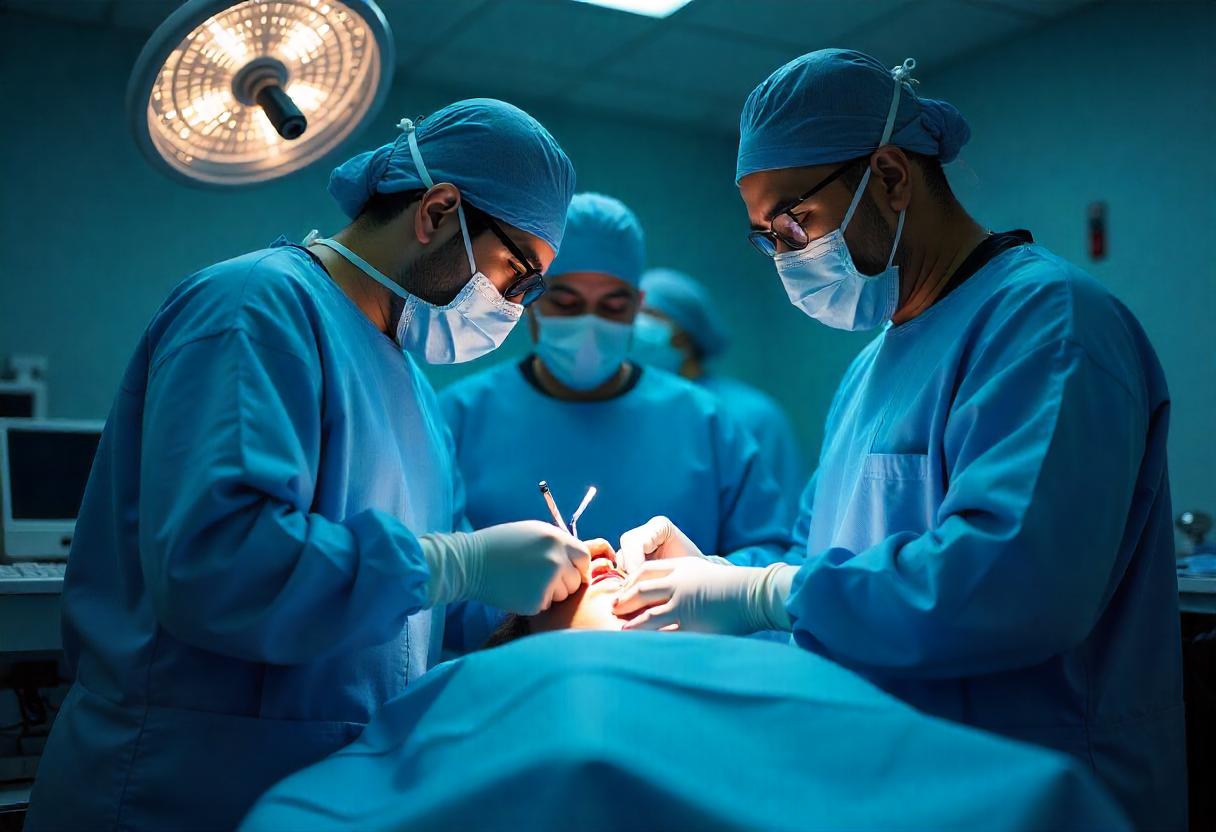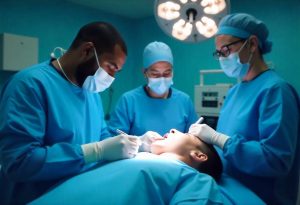Unraveling the World of Oral and Maxillofacial Surgery

Oral and maxillofacial surgery is a specialised field of dentistry that focuses on diagnosing and treating diseases, injuries, and defects in the mouth, jaw, and face. This intricate branch of medicine involves a wide range of procedures, from simple tooth extractions to complex reconstructive surgeries.
The Breadth of Oral and Maxillofacial Surgery: Common Procedures
Let’s delve into some of the most common procedures performed by oral and maxillofacial surgeons:
Wisdom Teeth Removal Wisdom teeth, the third molars, often emerge during adulthood and can cause various problems, including pain, infection, and crowding of other teeth. Oral and maxillofacial surgeons are skilled in removing these problematic teeth to alleviate discomfort and prevent future complications.
Dental Implant Placement Dental implants are artificial tooth roots that are surgically placed into the jawbone. They provide a strong and stable foundation for crowns, bridges, or dentures. Oral and maxillofacial surgeons are experts in implant placement and can restore your smile and improve your ability to chew and speak.
Corrective Jaw Surgery (Orthognathic Surgery) Orthognathic surgery is a corrective jaw surgery that addresses issues related to the alignment of the jaws, such as underbites, overbites, and crossbites. By repositioning the jaws, this procedure can improve facial appearance, chewing function, and speech.
Biopsies Oral and maxillofacial surgeons perform biopsies to diagnose oral cancer and other abnormalities in the mouth and jaw. A biopsy involves removing a small tissue sample for laboratory analysis. Early detection and treatment of oral cancer are crucial for successful outcomes.
TMJ Disorder Treatment The temporomandibular joint (TMJ) connects the jawbone to the skull. TMJ disorders can cause pain, clicking, and limited jaw movement. Oral and maxillofacial surgeons can diagnose and treat TMJ disorders using various techniques, including medication, therapy, and surgery.

Beyond the Basics: Specialised Treatments
Oral and maxillofacial surgeons also treat a variety of complex conditions, including:
Facial Trauma: Accidents and injuries can cause significant damage to the face and jaw. Oral and maxillofacial surgeons are skilled in repairing facial fractures and reconstructing damaged tissues.
Cleft Lip and Palate Repair: Cleft lip and palate are birth defects that affect the development of the lip and palate. Oral and maxillofacial surgeons perform corrective surgeries to improve facial appearance and speech function.
Oral Cancer: Oral cancer can develop in any part of the mouth, including the lips, tongue, cheeks, and floor of the mouth. Oral and maxillofacial surgeons diagnose and treat oral cancer through surgery, radiation therapy, and chemotherapy.
Sleep Apnea: Sleep apnea is a sleep disorder characterised by pauses in breathing during sleep. Oral and maxillofacial surgeons can treat sleep apnea with oral appliances that help keep the airway open.
Facial Infections: Facial infections can be caused by various factors, including dental infections and trauma. Oral and maxillofacial surgeons can diagnose and treat facial infections with antibiotics and surgical drainage, if necessary.
Advanced Techniques and Technology
Oral and maxillofacial surgeons utilise advanced technology and techniques to provide state-of-the-art care:
- 3D Imaging: This technology allows surgeons to visualise the patient’s anatomy in three dimensions, enabling more precise surgical planning and execution.
- Minimally Invasive Surgery: These techniques reduce surgical trauma, minimise scarring, and promote faster healing.
- Laser Surgery: Lasers offer precise cutting and tissue removal, reducing bleeding and pain.
- Bone Grafting: Bone grafting techniques are used to rebuild bone tissue lost due to injury or disease, providing a foundation for dental implants and other reconstructive procedures.
- Platelet-Rich Plasma (PRP): PRP therapy involves injecting concentrated platelets into the surgical site to promote healing and reduce inflammation.
- Sedation Options: Oral and maxillofacial surgeons offer various sedation options, including local anaesthesia, conscious sedation, and general anaesthesia, to ensure patient comfort during procedures.
Your Journey to Optimal Oral Health: The Patient Experience
Undergoing oral and maxillofacial surgery can be a daunting experience. However, by understanding the process and following your surgeon’s instructions, you can minimise discomfort and maximise your recovery.
What to Expect During Surgery The specific procedure will determine the duration of surgery and the type of anaesthesia used. Your surgeon will discuss the details of your procedure and answer any questions you may have.
Anesthesia Options Oral and maxillofacial surgeons offer various anaesthesia options to suit your needs and the complexity of the procedure. These options include local anaesthesia, conscious sedation, and general anaesthesia.
Post-Operative Care Following surgery, your surgeon will provide specific instructions for post-operative care, including pain management, diet, and oral hygiene. It’s essential to follow these instructions carefully to promote healing and prevent complications.
Managing Pain and Swelling Discomfort and swelling are common after oral and maxillofacial surgery. Over-the-counter pain medications and cold compresses can help manage these symptoms. Your surgeon may also prescribe stronger pain medication if needed.
Recovery Tips During the recovery period, it’s important to get plenty of rest, eat a soft food diet, and avoid strenuous activities. As you heal, you can gradually return to your normal routine.

The Benefits of Oral and Maxillofacial Surgery
Oral and maxillofacial surgery can significantly improve your oral health, facial appearance, and overall quality of life. Some of the benefits of these procedures include:
- Improved Oral Health: By addressing dental problems and restoring oral function, oral and maxillofacial surgery can improve your ability to chew, speak, and smile.
- Enhanced Facial Aesthetics: Corrective jaw surgery and facial reconstruction can enhance your facial appearance and boost your self-confidence.
- Restored Function: Procedures like dental implant placement and TMJ disorder treatment can restore your ability to eat, speak, and open your mouth fully.
- Pain Relief: Oral and maxillofacial surgery can alleviate pain caused by dental problems, facial injuries, and TMJ disorders.
- Improved Quality of Life: By addressing oral health issues and facial deformities, oral and maxillofacial surgery can significantly improve your overall quality of life.
Finding a Qualified Oral and Maxillofacial Surgeon
When choosing an oral and maxillofacial surgeon, it’s important to select a qualified and experienced professional. Look for a surgeon who is board-certified by the American Board of Oral and Maxillofacial Surgery. You can also ask for recommendations from your dentist or other healthcare providers.
If you have any concerns about your oral health or facial appearance, schedule a consultation with an oral and maxillofacial surgeon. They can assess your needs, discuss your treatment options, and answer any questions you may have.
By understanding the scope of oral and maxillofacial surgery and the expertise of these skilled professionals, you can make informed decisions about your oral health and achieve optimal results.
References:
https://www.cancer.org.au/cancer-information/types-of-cancer/mouth-cancer
https://www.healthline.com/health/cleft-lip-and-palate
https://www.healthline.com/health/sleep/obstructive-sleep-apnea
https://www.mayoclinic.org/diseases-conditions/tmj/symptoms-causes/syc-20350941
https://www.webmd.com/oral-health/crooked-teeth-misaligned-bites
